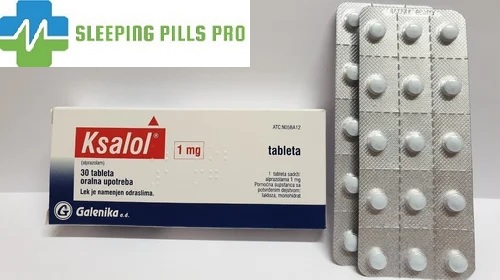Drug Classification and Composition : Ksalol 1mg
Ksalol 1mg is a brand name for a medication containing alprazolam, a benzodiazepine. Benzodiazepines are a class of drugs commonly prescribed to manage anxiety, panic disorders, and other conditions due to their calming effects on the central nervous system. Alprazolam is specifically known for its anxiolytic (anxiety-reducing), sedative, and muscle relaxant properties.
Indications : Ksalol 1mg
Ksalol 1mg is primarily prescribed for the short-term management of anxiety disorders, including generalized anxiety disorder (GAD) and panic attacks. It may also be used for other conditions such as insomnia or as a preoperative medication to reduce anxiety before surgical procedures. The effectiveness of Ksalol in treating these conditions is due to its ability to enhance the effects of a neurotransmitter called gamma-aminobutyric acid (GABA) in the brain, which has a calming effect.
Dosage and Administration : Ksalol 1mg
The standard dose for Ksalol 1mg is one tablet taken orally, typically prescribed to be taken two to three times a day. Dosage may vary depending on the patient’s condition, response to the medication, and medical history. It is crucial to follow the prescribing physician’s instructions and not to exceed the recommended dose, as increasing the dose can lead to serious side effects and dependency issues.
Onset and Duration of Action : Ksalol 1mg
Ksalol 1mg is known for its relatively fast onset of action, with therapeutic effects usually felt within an hour of ingestion. The medication’s effects can last for several hours, making it suitable for managing short-term symptoms of anxiety or panic. The duration of action can vary based on individual factors such as metabolism and overall health.
Side Effects: Ksalol 1mg
Common side effects of Ksalol 1mg include drowsiness, dizziness, light-headedness, and coordination problems. Other possible side effects are dry mouth, changes in appetite, nausea, and constipation. More severe side effects can include severe allergic reactions, such as rash, itching, or swelling, and significant changes in mood or behavior. Patients should report any severe or persistent side effects to their healthcare provider immediately.
Risk of Dependence and Withdrawal: Ksalol 1mg
As a benzodiazepine, Ksalol carries a risk of dependence and withdrawal symptoms, especially with prolonged use or misuse. Dependence can develop as the body becomes accustomed to the drug, requiring higher doses to achieve the same effect. Withdrawal symptoms can be severe and may include anxiety, agitation, tremors, and seizures. It is important to follow a healthcare provider’s guidance when discontinuing the medication, often involving a gradual reduction in dosage.
Drug Interactions: Ksalol 1mg
Ksalol can interact with a range of other medications, potentially altering its effectiveness or increasing the risk of adverse effects. Interactions may occur with other central nervous system depressants, such as alcohol, opioids, and other benzodiazepines, leading to increased sedation and respiratory depression. Additionally, drugs that affect liver enzymes, such as certain antifungals and antibiotics, can influence alprazolam metabolism. Patients should inform their healthcare providers of all medications and supplements they are taking to avoid harmful interactions.
Precautions and Contraindications: Ksalol 1mg
Patients with a history of substance abuse, liver or kidney impairment, or certain mental health conditions should use Ksalol with caution. It is also contraindicated in individuals with known hypersensitivity to alprazolam or other benzodiazepines. Pregnant or breastfeeding women should consult their healthcare provider, as the drug can cross the placenta and be excreted in breast milk, potentially affecting the baby.
Monitoring and Follow-Up: Ksalol 1mg
Regular monitoring by a healthcare provider is important while using Ksalol . This includes assessing the effectiveness of the medication, monitoring for side effects, and evaluating the potential for dependency. Follow-up appointments help ensure the medication is used safely and effectively, and adjustments to dosage or treatment plans can be made as needed.
Legal and Regulatory Status: Ksalol 1mg
Ksalol , containing alprazolam, is classified as a controlled substance due to its potential for abuse and dependence. Regulations regarding its prescription and distribution vary by country. In many places, it is available only by prescription, and its use is closely monitored to prevent misuse.
In summary, Ksalol 1mg, with its active ingredient alprazolam, is a valuable medication for managing anxiety and panic disorders. While it offers significant therapeutic benefits, it is important to use it responsibly due to its potential for side effects, dependence, and interactions with other drugs. Proper medical oversight ensures safe and effective use of this medication.

